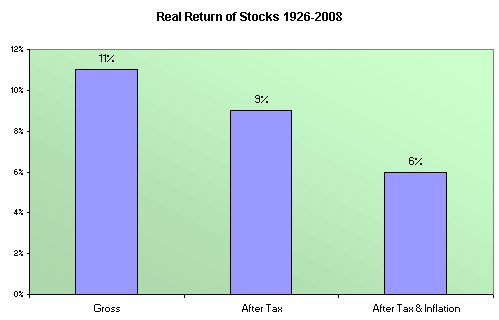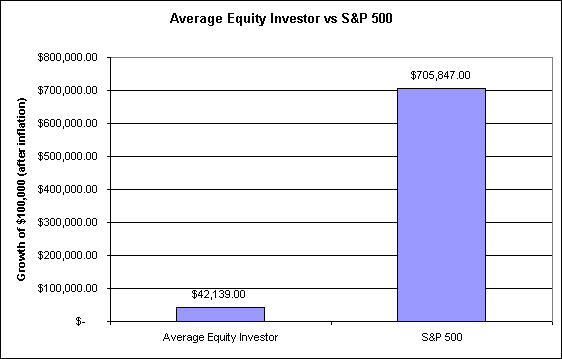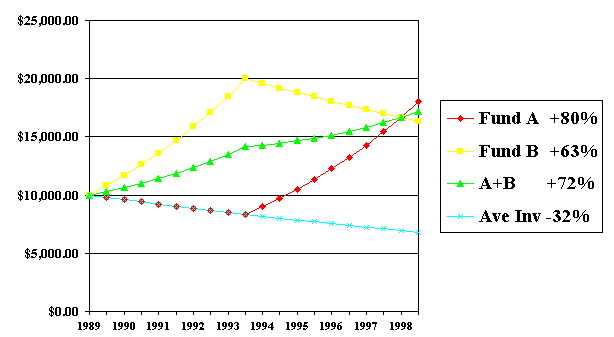What is a stock?
In addition to issuing bonds, companies may also issue stock in their corporation to raise capital (money). These shares of stock represent pieces of direct ownership in the underlying company. As an owner, these stock certificates entitle the owner to share in the profits of the company. Unlike with their bonds, companies that issue stock make no promises about the future rate of return that stockholders will receive.
From 1926-2003 US Large Company Stocks have produced an 11% gross return while US Small Company Stocks have returned approximately 13%. As you can see, historically, stock investors (owners) have been rewarded approximately twice as much as bond investors. Better still, gains achieved through owning stocks (capital gains) are taxed at a much more favorable tax rate (currently 15%) than bonds. So even after the effects of taxes and inflations, stock investors have been rewarded with a real return of approximately 6% above and beyond taxes and inflation.
If the goal is to achieve growth in a portfolio, an investor has no choice but to commit to stocks.

Investor vs Investment Performance

Investors Typically Fail
Investors often find themselves paralyzed by the thousands of investment products available to them today. A recent Dalbar study confirmed what we have known for years: In trying to beat the market, most investors end up doing much worse. During one of the most profitable periods for stocks in recent U.S. history, the average equity investor's performance trailed that of even the One Year Treasury Bill.
Without a financial plan and a disciplined investment approach, investors are doomed to fail before they even begin.
Discipline is the Key

Discipline is not only a good idea; it is critical to investing success. The best investment vehicles in the world are useless unless an investor has the discipline to utilize them properly.
Consider the two fictional investments depicted above, Fund A and Fund B. Each of these funds follows a different investment style. Despite the volatility, each fund produced a handsome return for its shareholders over a ten-year time horizon. Any investor who bought Fund A and did nothing for 10 years would have made 80% on his money. Any investor who bought Fund B and did nothing for 10 years would have made 63% on his money. Any investor who put half of his money in Fund A and half of his money in Fund B and did nothing for 10 years would have made 72% on his money.
However, when we analyzed a real world 401k plan similar to this one, we found that most participants actually lost money in their accounts over the 10-year period. We found that most investors had put all of their money in Fund A initially because it had a higher trailing five-year return than Fund B. These investors held onto this fund as it lost money for one year, two years, and three years in a row. But notice, all the time that Fund A was losing money, Fund B was making quite a bit of money. The participants noticed this as well. Somewhere around year four or five, most Fund A investors sold their "under performing" Fund A and purchased the "outperforming" Fund B. Sadly, this is exactly the type of advice that investment professionals give to their clients: "sell the laggards and buy the leaders".
As you can see, at about this same time, Fund B started its own multi-year period of underperformance. The end result was that most participants owned Fund A during its worst stretch, and then owned Fund B during its worse stretch. Most participants actively managed their portfolios to a net loss.
The lesson is that it is much more important to fill your portfolio with investments that behave differently than it is to try to guess which will be the best performing investments. Intelligent investors diversify their portfolios broadly and remain disciplined through thick and thin.
Previous Lesson: Bonds = Owner | Table of Contents | Next Lesson: Retirement Investing
